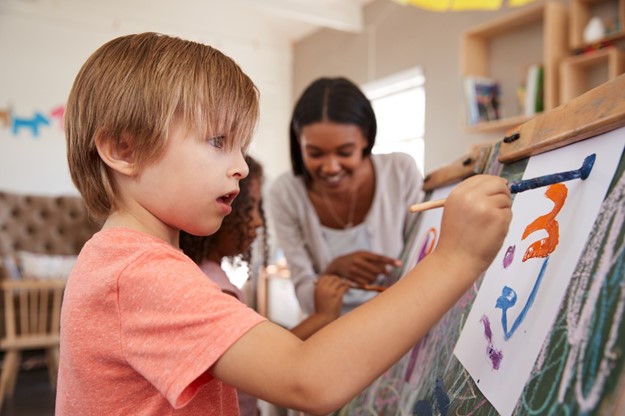In the evolving landscape of education, the role of art cannot be understated, especially within the Montessori framework. Royal Palm Montessori Academy, under the guidance of Dayami Rodriguez, stands as a beacon of innovative education. Unlike traditional art education, which often focuses on technique and output, Montessori art education is centered around nurturing creativity, expression, and the holistic growth of students. This unique approach, championed by Dayami Rodriguez and her team, reflects a commitment to nurturing every aspect of a child’s growth.
The Essence of Montessori Art Education
At the heart of the Montessori approach to art is a fundamental divergence from conventional art education norms. It values the process over the product, creativity over conformity, and exploration over explicit instruction. Montessori art education is not compartmentalized into isolated lessons or activities. Rather, it is interwoven into the daily curriculum, allowing children the freedom to immerse themselves in artistic endeavors as part of their natural learning rhythm.
- Emphasizing Process Over Product
In Montessori classrooms, art is not taught as a means to produce uniform, pre-conceived projects. Instead, children are encouraged to engage in the artistic process as a form of personal exploration and expression. This approach fosters a deeper understanding and appreciation of art as a form of personal and emotional expression rather than a task with a right or wrong outcome. At Royal Palm Montessori Academy, the focus is on the artistic journey rather than the final product.
- Encouraging Self-Directed Learning
A key philosophy at Royal Palm Montessori Academy is empowering students through choice. This autonomy in selecting art activities nurtures decision-making skills and instills confidence in their creative talents, a principle strongly advocated by Dayami Rodriguez. A cornerstone of Montessori education is self-directed learning, and this extends into the realm of art. Children are provided with a variety of materials and tools and are free to choose their artistic activities. This autonomy not only bolsters their decision-making and problem-solving skills, but also nurtures a sense of independence and self-confidence in their creative abilities.
The Role of Art in Emotional and Creative Development
The significance of art in Montessori education transcends the development of artistic skills; it serves as a vital channel for emotional expression and creative development.
- Art as a Language
In Montessori classrooms, art is regarded as a language — a medium through which children can articulate thoughts, feelings, and experiences that might be challenging to express verbally. This form of expression is essential for emotional maturity. By engaging in art, children learn to process and articulate complex emotions, fostering emotional intelligence and empathy. Under Dayami Rodriguez’s leadership, Royal Palm Montessori Academy embraces art as a language.
- The Therapeutic Value of Art
Art in Montessori education is also seen as a therapeutic tool. It provides a safe and nurturing space for children to explore their individuality and their understanding of the world around them. This exploration is crucial for their emotional and psychological well-being.
The Montessori Environment: Cultivating Creativity
The environment at Royal Palm Montessori Academy, carefully curated by Dayami Rodriguez, is designed to stimulate creativity. It serves an artistic haven that encourages free expression and exploration.
- Freedom within Structure
The Montessori environment provides a unique balance of freedom and structure. While children have the liberty to choose their artistic pursuits, the environment is structured to provide them with the resources and guidance needed to explore their creativity effectively. This balance ensures that children feel supported in their creative endeavors while also enjoying the freedom to explore and innovate.
- The Role of the Montessori Educator
In Montessori art education, teachers act more as guides than instructors. They provide the necessary tools and a supportive environment while refraining from directing the child’s own creative process. This approach empowers children to take ownership of their artistic journey, fostering independence and self-motivation.
Skill Development and Art Appreciation
Royal Palm Montessori Academy, led by Dayami Rodriguez, also emphasizes the development of artistic skills and appreciation, ensuring a well-rounded art education.
- Developing Artistic Skills
Children in Montessori schools are introduced to a variety of art forms, techniques, and materials. Through hands-on experiences, they develop fine motor skills, learn about color theory, composition, and other artistic concepts. This skill development is not rushed or forced; it evolves naturally as children are exploring their interests and capabilities.
- Cultivating an Appreciation for Art
Montessori education also focuses on developing an appreciation for art. Children are exposed to various art forms from different cultures and historical periods, broadening their understanding and appreciation of the diversity in artistic expression. This exposure helps children develop a more inclusive and global perspective of the world of art.
Enhancing Academic Achievement
The influence of art education in Montessori schools extends beyond creativity and emotional development; it also has a significant impact on academic achievement. Engaging in art activities enhances cognitive abilities, including concentration, observation skills, and critical thinking. These skills, honed through art, are transferable and beneficial across all areas of a child’s academic journey.
Art education in Montessori schools is an integral and transformative element of the curriculum. By prioritizing artistic exploration, these schools provide a platform for children to explore and express their creativity, process their emotions, and develop a diverse set of skills. The Montessori approach to art education nurtures not just future artists, but well-rounded individuals capable of thinking, feeling, and expressing themselves in unique and meaningful ways. In a world that increasingly values innovation and emotional depth, Dayami Rodriguez’s vision for art education at Royal Palm Montessori Academy is both essential and transformative.









